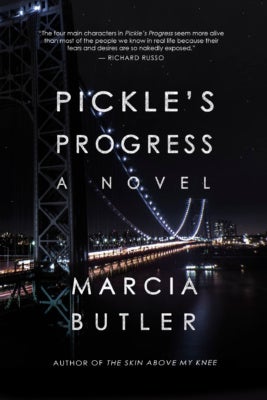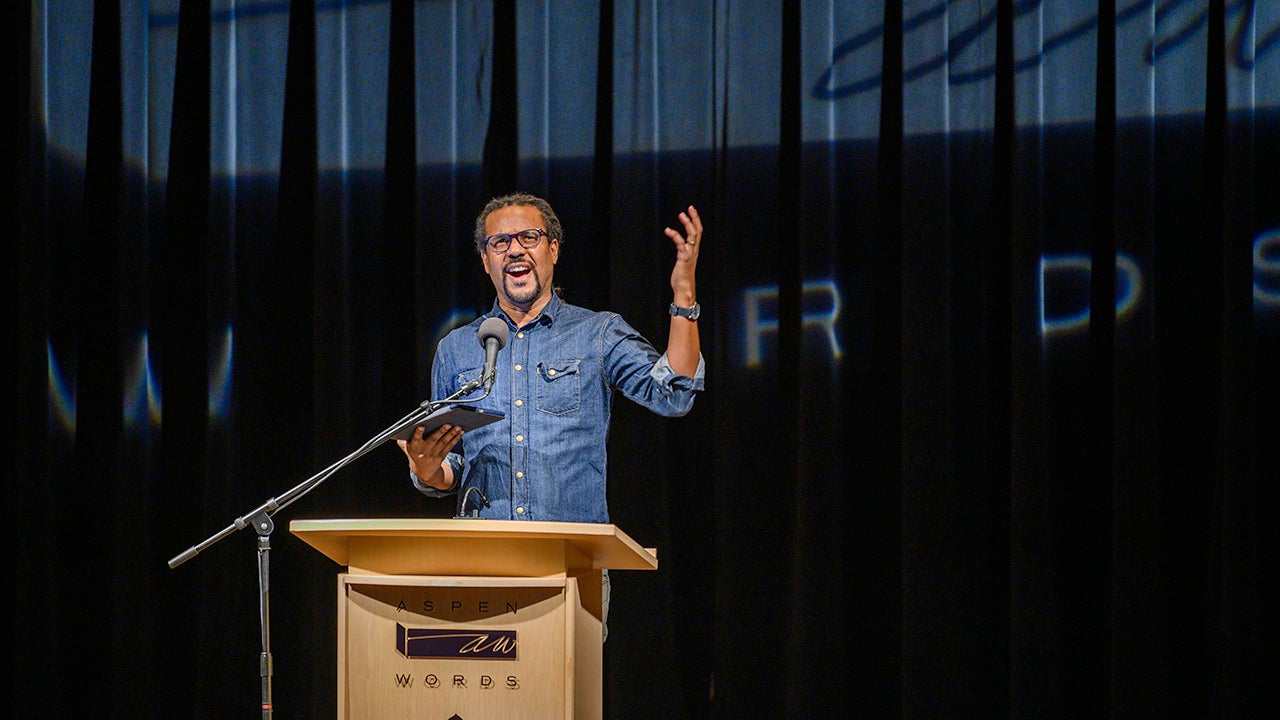Marcia Butler has had a number of creative careers: professional musician, documentary filmmaker, interior designer and author. A former Aspen Words writer in residence, Butler’s latest project is a novel, “Pickle’s Progress.” The book takes place over the course of five weeks, as identical twin brothers, one wife, a dog and a bereaved young woman collide with each other to comical and sometimes horrifying effect. Everything is questioned and tested as they jockey for position and try to maintain the status quo, where love is the poison, the antidote, the devil and, ultimately, the hero. Following is an excerpt of “Pickle’s Progress,” which debuts on April 9.
 When approaching The George Washington Bridge from the Manhattan side, the Bridge Apartments rise improbably out of asphalt, cement, and oil slick. The building serves as a New York City landmark for radio heads announcing congestion at rush hour. “Traffic is backed up for two miles approaching the Apartments,” is a frequent warning to any driver heading out of the city on a typical Friday afternoon. The high-rise is deeply ingrained in the psychic architectural lexicon of New Yorkers who own a car and have a need to travel to New Jersey on a daily, weekly, or monthly basis.
When approaching The George Washington Bridge from the Manhattan side, the Bridge Apartments rise improbably out of asphalt, cement, and oil slick. The building serves as a New York City landmark for radio heads announcing congestion at rush hour. “Traffic is backed up for two miles approaching the Apartments,” is a frequent warning to any driver heading out of the city on a typical Friday afternoon. The high-rise is deeply ingrained in the psychic architectural lexicon of New Yorkers who own a car and have a need to travel to New Jersey on a daily, weekly, or monthly basis.
Living in the Apartments requires a certain amount of shoulder-shrugging resignation. Air quality is dodgy most days. The floors shake continually from eighteen-wheelers rumbling underneath the building on the Cross Bronx Expressway. Yet, despite these atmospheric and automotive tectonic shifts, residents—solidly middle- to lower- class—remain stoic, or better, sanguine. Perhaps a reflection of the flexibility of New Yorkers, the building is mercurial—simultaneously in-your-face yet off -your-radar.
Pickle gazed out the large window in his apartment, tossed his cell phone into the pillow at the head of his bed and flicked off his police scanner. If he looked down, his current view of the bridge and the Hudson River might reveal a one-car demolition derby or a swan dive into the water. But he felt disconnected from what he knew had just transpired: both. That was the curious paradox about living thirty-two floors above river level—the panorama that excited him also made him a witness to an occasional tragedy. But most days, he considered his view as just a wide country road dangling from metal marionette ropes, all manipulated by some version of God.
He assumed his twin brother and sister-in-law were holding up traffic. But then he noticed that cars were, in fact, moving steadily in both directions. Through the fog, the glow of headlights engorged as they moved toward him, while red taillights fizzled to nothing. This meant, of course, that their accident was negligible. No one crossing the bridge would know that a man had leaped to his death, unless they stopped to ask. And no one in his or her right mind would stop, or even care, at this hour of the morning. He fumed; let them wait.
Pickle burped. The Indian food he’d eaten a few hours earlier sat leaden in his stomach. Yellow-orange curry had dribbled down the front of his sky-blue Mets T-shirt—not a nice blend of colors. And he stank. Of saffron, of body odor, of someone else’s cigarette smoke, of his own fetid breath. Yet the woman asleep under his bedcovers, not having moved an inch during the call with Stan and Karen, hadn’t seemed to mind the offensive scents escaping from various parts of his body. Hasty sex and the late hour had thrown her into a hard sleep. But not Pickle. Sex always woke him up and made his brain go a bit mad—pinging on all pistons.
He walked to the other side of the bed, kicking a shoe with a stiletto heel out of his way, and poked at her through the covers, guessing at the location of her ass. She didn’t move but snorted in disgust.
“Come on. Get up,” Pickle barked.
“No.” The pillow muffled her voice.
“You have to go.”
“Why?” Now she canted her head, eyes like slits, toward Pickle.
“Because I have to go to work.”
“You said you had the day off.” She propped her torso up on both elbows, her heavy breasts swinging like Newton’s Cradle.
“Something’s come up. You gotta leave.”
The woman finally turned over, tossed the comforter back, stood up buck naked, and began gathering her clothes. After a quick stop in the bathroom for a pee, she threw a parting shot over her shoulder. “Pickle, think a hundred times before you call me again.”
Pickle locked the door with a snap of his wrist and turned to consider his jumbled studio apartment. The bed was front and center, because that’s where he spent most of his time during the few hours he wasn’t working his typical sixty-hour week. A Parsons table doubled as a surface for a laptop and meals, one armless chair tucked underneath. He’d jammed an old dresser inside the only closet, shoving his hanging clothes, mashed and wrinkled, to one side. But what did he care? He wore jeans and T-shirts most of the time, anyway. With the kitchen taking up one wall and the west-facing window soaking up another, the remaining wall space was dedicated to a flat-screen TV mounted directly opposite the bed. This 400-square-foot room was the sum total of Pickle’s personal life since he’d joined the police force, straight out of cadet training. At the time, one room and low rent was all he could manage and even needed. But through the years he’d come to prefer it, love it, in fact. Because his eyes owned the near and distant horizon, like a bird in an aviary where, in at least one direction, there were no limits. Dumpy as the place was, Pickle had a surprising million-dollar view.
Before he left to rescue Stan and Karen, he returned to the window and stood dead center of the bridge’s crossed steel trusses, like enormous see-through Legos anchored deep into the ground. Pickle cast his eyes to the westernmost point and pondered what it might feel like to not be Stan McArdle’s twin.
They were truly identical—the rarest—indistinguishable even at third glance. As infants and then as toddlers, their mother had been reduced to dressing them in different colored outfits just to tell them apart—they were that interchangeable. On fourth glance, the one distinguishing mark was a red mole on Stan’s leg. That dermatological miracle was the only indication that they were different—and to Pickle’s young mind, like midnight and noon.
Growing up, Stan gave Pickle searching rights whenever he felt the urge. Lying on the bed, pliable as a damp rag, Stan allowed Pickle to inspect his body to locate that dot, again and again, which Pickle saw as important as an Eagle Scout merit badge. But it was impossible to share with the world, as the thing lived on Stan’s uppermost thigh. So, when the public at large pointed out for the ten-millionth time— Look! They’re completely identical!—Stan refused to drop his drawers on command, much as Pickle pleaded.
They were adults now—still the same weight, wrinkles appearing at the same pace, temples greying not at all—still utterly identical. And ridiculously handsome. The swivel-headed stares continued—now not so much for being twins—but for their Clark Gable looks. With emerald eyes, coal-black hair and clear, wan complexions, the brothers could pull a noisy room down to a whisper. Pickle turned to the mirror glued to the back of the front door of his apartment and scrutinized his face. Sure, he was good-looking— that part was easy and didn’t even count, because he wasn’t responsible for that luck of the genetic draw. The problem was he didn’t feel smart enough, and not nearly clever enough. He wasn’t terribly ambitious and though he’d risen in the ranks on the police force, he couldn’t even acknowledge that small amount of success. The truth was, he’d just never live up to the way of his brother.
The corner of a framed photograph poked out from under the bed and caught his eye. Pickle had kicked it there months ago, for what reason, he couldn’t exactly remember. Bending down, he pulled it out, dragging along with it an unused condom covered with dust balls. It was an eight by ten, black-and-white image from Karen and Stan’s wedding. They stood in a line—Stan at the left, Karen in the middle and Pickle on the right. The shot was not posed; they were all in mid-motion, but the lens’s focus landed squarely on Karen. The photographer knew his craft and had zeroed in on her beauty. That left Stan and Pickle a bit fuzzy. Still, the composite impression was decidedly a trio shot.
Pickle strained to recall the exact moment, and what might have caused Karen to glance away from the camera. Her gaze, aimed sky- ward, left her mouth in a crooked, slightly ironic smirk. Her eyebrows slanted in a concerned parenthesis, as if a hawk were about to swoop down, grab her by the hair and drag her off. She looked just this side of afraid, dressed in virginal white.
This was the only image Karen had given Pickle from the dozens taken that day. There were so many that perfectly captured the wedding, now in evidence stacked across the mantel above the living room fireplace in the brownstone. But this one was not exceptional, with expressions that didn’t particularly flatter any of them. It was such an odd selection, and he had pressed her about it.
“This is a shitty photo. Why’d you even bother framing it?” he’d asked.
Karen had flatly dismissed him. “I don’t know, Pickle. It just looks like who we are. Okay? Let it go.”
He did let it go, for a long time. Now, before coming to their aid once again, Pickle suddenly understood what she meant. Karen was the only one in focus.


